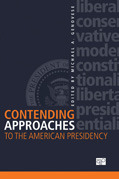Contending Approaches to the American Presidency
- Michael A. Genovese - Loyola Marymount University, Los Angeles, CA
Presidency
All chapters follow a consistent structure, encouraging students to compare ideas across chapters. Contributors also examine their approach in light of presidential-congressional relations, presidential power and accountability, the rule of law, as well as domestic and foreign policy. Making explicit what is often implicit, this engaging and unique examination of the presidency helps readers better understand presidential power and leadership.
[COB--he'll want to see pdf chps to see that Genovese answered to his suggestions in revising the intro. As well, Genovese rearranged the order of chapters given his feedback. I edited his quote slightly, pulling from 3 different places in his review.]
"The biggest strength of this book is its unique approach to understanding the presidency through multiple ideological and theoretical perspectives. The way that the chapters are organized is another strength of the book. I liked that the chapters have consistency in how they are structured. Each perspective was introduced, problems associated with the presidency were identified, potential solutions were proposed, and concluding remarks closed the chapter. The editor makes the case that understanding the presidency through a number of clashing perspectives allows for perhaps a more holistic assessment of the office."
"The book fills a need in presidency literature, because it deals explicitly with various ideological and institutional perspectives that presidency scholars use when evaluating the institution."
I do believe that Professor Genovese has an interesting idea because many of terms thrown around when describing the presidency are left undefined. The general idea of having each of the scholars contributing answering the same question provides an excellent point of departure for students so they can engage in comparisons and debate over the different perspectives.
My general impression is that this is an extremely interesting framing of a manuscript project! I generally agree with the contention that because “few authors reveal their ideological or partisan preferences, readers often have a difficult time understanding what values, goals, and political orientations animate writings about the presidency.” The impulse to make these preferences – and their implications for presidential power – explicit in a series of chapters within a single edited volume is a very good one.
Examining how different ideologies and partisan viewpoints impact our evaluation of presidential power is a provocative idea for a book.

